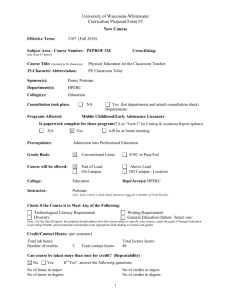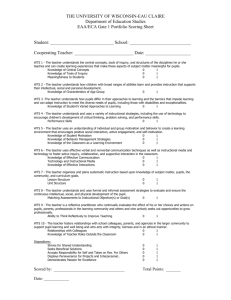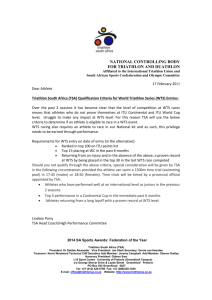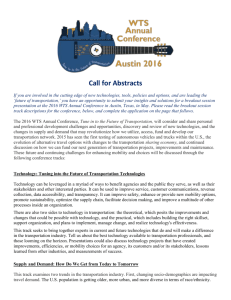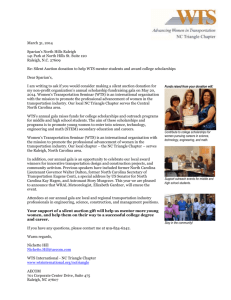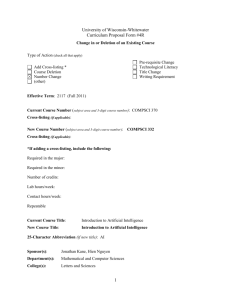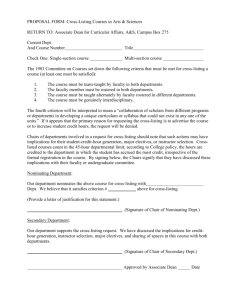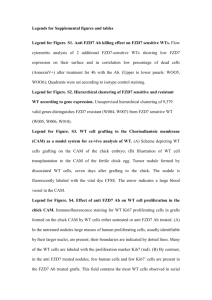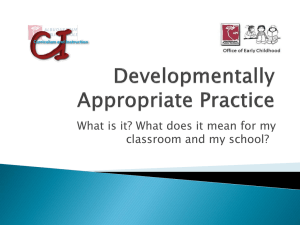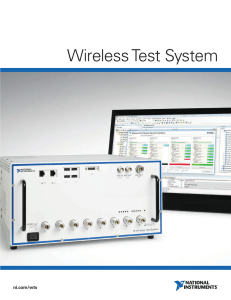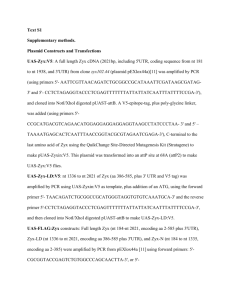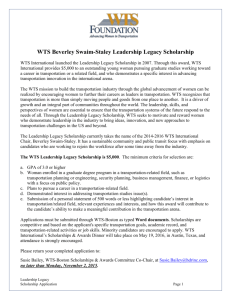peprof328 - University of Wisconsin
advertisement
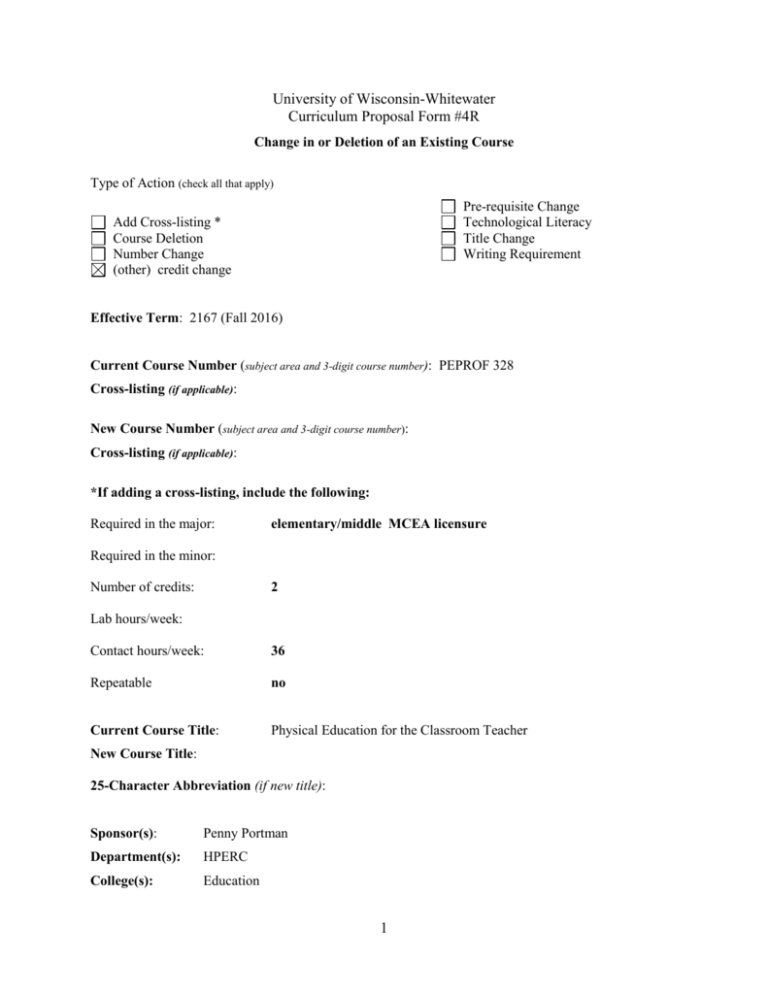
University of Wisconsin-Whitewater Curriculum Proposal Form #4R Change in or Deletion of an Existing Course Type of Action (check all that apply) Pre-requisite Change Technological Literacy Title Change Writing Requirement Add Cross-listing * Course Deletion Number Change (other) credit change Effective Term: 2167 (Fall 2016) Current Course Number (subject area and 3-digit course number): PEPROF 328 Cross-listing (if applicable): New Course Number (subject area and 3-digit course number): Cross-listing (if applicable): *If adding a cross-listing, include the following: Required in the major: elementary/middle MCEA licensure Required in the minor: Number of credits: 2 Lab hours/week: Contact hours/week: 36 Repeatable no Current Course Title: Physical Education for the Classroom Teacher New Course Title: 25-Character Abbreviation (if new title): Sponsor(s): Penny Portman Department(s): HPERC College(s): Education 1 List all programs that are affected by this change: Elementary/Middle School-MCEA licensure If programs are listed above, will this change affect the Catalog and Advising Reports for those programs? If so, have Form 2's been submitted for each of those programs? (Form 2 is necessary to provide updates to the Catalog and Advising Reports) NA Yes Proposal Information: I. They will be submitted in the future (Procedures for form #4R) Detailed explanation of changes (use FROM/TO format) FROM: Physical Education for the Classroom Teacher 3 units The course is designed for those who plan to work with children middle childhood/early adolescence. Emphasis will be placed on understanding, planning, and teaching a developmentally appropriate and integrative physical activity for children within these ages. TO: Physical Education for the Classroom Teacher 2 units The course is designed for those who plan to work with children middle childhood/early adolescence. Emphasis will be placed on understanding, planning, and teaching a developmentally appropriate and integrative physical activity for children within these ages. II. Justification for action The field component of this course included observation in a public school three times prior to developing the lesson, teaching it to the peers and finally the teaching of the developmentally appropriate integrative lesson to the students/class observed in the school. Due to changing school policies and greater demands for public school accountability (e.g., Students Learning Outcomes, Professional Development Plans, Educator Evaluator Models) the teaching sites will not be available after Fall 2016. Physical Education for the Classroom Teacher fall 2016 Instructor: Dr. Penny Portman 114 Williams Center 472-5643 portmanp@uww.edu Office Hours: MW 9-11:00 2 Pre-requisites: Must be admitted into the College of Education and Professional Studies Professional Education Program Textbook: Physical Education for Classroom Teachers (packet on D2L). Course Description: This course is designed for those who plan to work with children in elementary and middle school grades. Emphasis will be placed on understanding, planning, and teaching a developmental physical activity program appropriate for these children. Objectives: By the end of the course: 1. The student understands physical education content, interdisciplinary concepts, disciplinary concepts, and tools of inquiry related to the development of a physically educated person. (WTS #1) Specifically the student will receive specific instruction, activities and assignments on appropriate physical education for students in elementary and middle school grades, notably classroom rules and discipline procedures, interdisciplinary curricular approaches in cooperative activities, health, science, math, social studies, and language arts with physical activity, and assessment tools. Assessment: Reflective Research Paper 2. The student understands how children learn and develop and can provide learning opportunities that support that intellectual, social, and personal development. (WTS #2) Specifically the student will observe physical education classes and develop an ageappropriate interdisciplinary lesson plan to be taught first to peers and then to the classroom students. Assessment: Toy/TV/Montage Assignment 3. The student uses an understanding of individual and group motivation and instructional strategies to create a learning environment that encourages positive social interaction, active learning, and self-motivation. (WTS #3) Specifically the student will discuss, observe the use of by a master teacher, and utilize the strategies in their classroom lesson to their peers and in-school students. Assessment: Observations in physical education setting and Planning Commentary 4. The student demonstrates an understanding of teaching strategies designed to increase student time on task and individualize instruction to accommodate a variety of skill levels. 3 (WTS # 4, 5, 7) Specifically the student will practice management skills in small group situations among their peers and utilize the teaching strategies in their lessons. Assessment: Classroom Rules and Peer-Teaching on Management 5. The student plans instruction and uses formal and informal reflection strategies based upon knowledge of the subject matter, students, the community, and curriculum goals (WTS #9). Specifically the student will plan, teach, and evaluate a developmentally appropriate interdisciplinary physical activity lessons. Assessment: Lesson Plans and Evaluation of Lessons 6. The student understands how students differ in their approaches to learning and understands how federal laws (IDEA, Title IX, Negligence/Liability, Bullying) affect physical education programs. (WTS #10) Specifically the student will apply knowledge of safe environments in their teaching. Assessment: Simulation Exercise All assignments will be handed in on time unless previous arrangements have been made. Late assignments will be accepted although for less than total points. Teaching can only be rescheduled if arrangements are made prior to day of teaching. Grading: Your grade will be based on the total number of points accumulated during the semester. Points will be given for the following: Planning Commentary (minimum score 13) Activity Paper (1) 10 points Lesson plan Teaching experience Evaluation of one’s lesson TV/Toys Rules Pedometer Exercise Total = 130 points 4 = 40 points = 10 = 10 = 20 = 10 = 15 = 10 = 15 A = 93-100% A- 90-92 B+ 87-89 B 83-86 B- 80-82 C+ = 77-79 C 73-76 C70-72 D+ 67-69 D 63-66 D- = 60-62 F 59 or below UW-W has a no cut policy. All students may miss 2 classes without penalty. All other classes missed will result in a 10 (ten) point deduction per class missed. Two tardies will drop 5 points from your total points. Attendance will be taken at every class. Students will be excused from class of religious observances (and all school sponsored events) if notification is given within the first two weeks of school. It is the student’s responsibility to make up all work and turn in assignments on time. The University of Wisconsin-Whitewater is dedicated to a safe, supportive, and nondiscriminatory learning environment. It is the responsibility of all undergraduate and graduate students to familiarize themselves with University policies regarding Special Accommodations, Academic Misconduct, Religious Beliefs Accommodation, Discrimination and Absence for University Sponsored Events. (For details please refer to the Schedule of Classes; the “Rights and Responsibilities” section of the Undergraduate Catalogue; the Academic Requirements and Policies and the Facilities and Services sections of the Graduate Catalogue; and the “Student Academic Disciplinary Procedures” [UWS Chapter 14]; and the “Student Nonacademic Disciplinary Procedures” [UWS Chapter 17]). “The UW System standard for work required per credit is that students are expected to invest at least 3 hours of combined in-class and out-of-class work per week for each academic unit(credit) of coursework; thus a 2-credit course will typically require a minimum of 6 hours of work per week (96 hrs/semester).” Schedule 4 September Introduction *Survey *Toy and TV Assignment 9 PE Experience *Writing assignment-activity paper 11 Who’s is saying what about ‘our’ students? *Toy or TV Assignment due 16 Outdoor activities to play with your class*Dress comfortable and with ‘gym’ shoes 18 Playground Games *Dress comfortable and with ‘gym’ shoes 23 Teaching Packet explanation and sign-ups *Download forms from D2L 25 How do good teachers teach? 5 *Read in advance Baseball Theory of Teaching Effectiveness (packet) 30 How do good teachers teach? 2 Oct How do good teachers teach? Management Strategies-walk, watch, talk, stop *Rules assignment 7 Management Scenarios *Rules Due 9 Lesson Planning and Planning Rubric assignment 14 What do good teacher teach? *read Integrating curriculum articles D2L *introduce pedometer assignment 16 Integrating Physical Activity across the Curriculum The Environment/Science 21 Integrating Physical Activity- Health Life Style *Favorite snacks 23 Integrating Physical Activity- Social Studies/Language Arts *Baseball Theory- 2nd base 28 Planning Commentary paper due with lesson plan *Pedometer assignment due 30 Negligence and Liability 4 NovGroup 1- Peer Teaching 6 Group 2 – Peer Teaching 11 Group 3 –Peer Teaching 13 Group 4-Peer Teaching 18 Group 5-Peer Teaching 20 Group 6- Peer Teaching 25 Activities to make your class work together 2 DecCooperative Activities 4 Working with children with disabilities 9 Wheelchair Basketball Team Demonstration 11 Wrap up/Evaluations Final – Section 1 Thursday 18 December 9:00 Section 2 Tuesday 16 December 10:00 6
